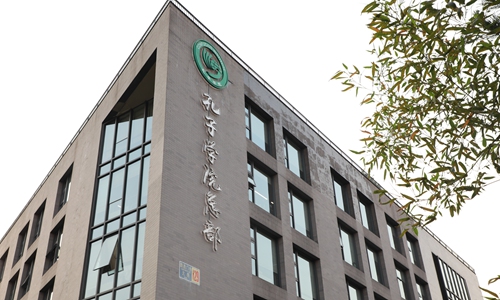
The Confucius Institute headquarters in Beijing. (Photo: IC)
We understand the university's decision and are willing to cooperate with relevant parties to do follow-up work, but we oppose the politicization of normal education cooperation, the Confucius Institute Headquarters said in a statement to the Global Times on Saturday, after the University of Maryland (UMD) - the first university in the US to host a Confucius Institute (CI) - announced an end to the agreement on Friday.
The UMD expressed its helplessness in making the decision. We also deeply regret it, said the CI Headquarters.
UMD President Wallace D. Loh said in a letter on Friday that his university has notified CI Headquarters in Beijing that they are ending their agreement, which will expire in June, after evaluating the impact of the National Defense Authorization Act for Fiscal Year 2019 enacted by the US Congress in 2018.
This act includes language that prevents organizations that host a CI from participating in certain federally funded programs. "After evaluating the impact of this legislation on the UMD, it became evident that we can no longer host the Confucius Institute at Maryland (CIM)," Loh said. He gave high credit to the efforts the CI has made over the past years.
"We resolutely oppose the politicization of normal education cooperation and firmly safeguard the legitimate rights and interests of the Confucius Institute," said the CI Headquarters.
"We hope that all parties will treat the Confucius Institute objectively and fairly."
"The US-China relationship is of global and strategic importance. Amidst the rising geo-political, economic, and cultural tensions, UMD will remain steadfast in its commitment to engage responsibly with academic institutions in China, and elsewhere in the world, in order to help manage - if not solve - the vexing challenges of our age," Loh said.
He pledged that the UMD will help create opportunities for K-12 students in the region to learn the Chinese language and culture which he believes will be "important for our nation's effective global engagement in this century."
The UMD applied on its own initiative to host the first Confucius Institute in the US in 2004. "Over the years, the Confucius Institute has operated legally and in compliance with regulations, and is open and transparent.
It has played an important role in promoting Chinese education in the region as well as facilitating mutual understanding and friendship between Chinese and American people," said the Confucius Institute Headquarters.
The CIM has engaged in educational outreach by providing teachers of Chinese language and culture to K-12 schools in Maryland and Washington, DC, as well as offering language classes to the general public, Loh said.
To minimize the impact on the schools and communities that depend on the teachers provided by CIM, the UMD will continue to support the on-going classes through the end of this academic year.
Loh said they have also been working with CI Headquarters and independent local organizations in the Maryland and Washington, DC area to potentially transition CIM and its activities so that there would be continuity of educational offerings for K-12 schools after CIM separates from the university.
"The transition details will be worked on in the months ahead," he added.


